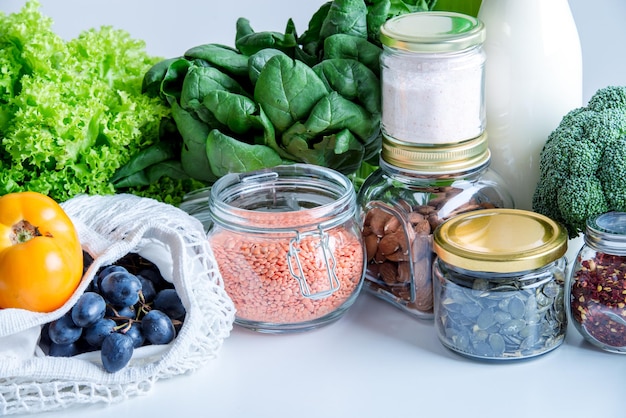Probiotics and Their Benefits
Probiotics have a mutually beneficial relationship with the human body. They help detoxify substances you consume, digest the fiber you eat, and balance your gut. They even produce B vitamins and serotonin. When you consume probiotics through supplements or foods, they help establish a healthy microbiome with diverse microbiota in your gut.
When your body is colonized by health-promoting probiotic organisms, your physical, mental, and emotional well-being are in balance. This can elevate your health, providing incredible immune function, mental clarity, and superior digestion. For many, the chain reaction of health benefits keeps the whole body healthy and reduces the likelihood of developing health, digestive, and mood-related issues.
Probiotic Quick Facts
What Are They: Living beneficial bacteria and yeasts
Main Benefit: Gut health
Food Sources: Yogurt, sauerkraut, kombucha, kefir, kimchee
What Are Probiotics?
Simply put, probiotics are living bacteria and yeasts. The key difference between a probiotic and a harmful bacteria is that probiotics have a symbiotic, or mutually beneficial, relationship with your body. Everyone carries hundreds of probiotic microbes in their digestive system, on their skin, in their mouth, and other orifices like nostrils. The gastrointestinal tract alone harbors more than 500 different bacterial species. Sometimes, this ecosystem gets disrupted and off-balance. Ensuring your gut microbiota is balanced plays an important role in overall health.
Top Health Benefits of Probiotics
Probiotics offer many well-established health benefits, including balancing the gut, improving digestion, and alleviating the uncomfortable side effects of harsh antibiotics. The top benefits of probiotics include:
Enhanced immune system response, balancing out the adverse effects of antibiotics, including occasional diarrhea, calming colon irritation, healthier looking skin and improved complexion, enhanced ability to digest food, therapeutic effects for upper respiratory health, improved lactose tolerance, promoting healthy yeast balance, support for vaginal health, increased nutrient absorption from food, encouraging normal digestive health, including promoting normal bowel movements, promoting oral health and acting as a remedy for bad breath (halitosis), increased ability to synthesize B vitamins, heightened ability to absorb calcium, and supporting vitamin K production.
Probiotic Research
Researchers regularly publish new and exciting discoveries about the benefits of probiotics. Here are some of the most exciting recent findings on how probiotics can support your health:
Studies show that probiotics improve the bioavailability of many essential nutrients in the body such as zinc, iron, phosphorus, all of the B vitamins, calcium, copper, and magnesium. A study on the probiotic strain Bacillus infantis showed significant potential for normalizing bowel function in patients with digestive discomfort. Probiotics significantly lower the rate of diarrhea and diaper rash in babies consuming infant probiotics. Active bacteria cultures, such as Acidophilus, aid in reducing intolerance to the lactose found in dairy products. Several studies on probiotics indicate that, by regulating intestinal transit time of fecal matter, probiotics can dramatically reduce constipation in the elderly. Other reports suggest that some forms of probiotics promote the growth of healthy bacteria in the colon, significantly reducing the conversion of chemical compounds in feces into carcinogens. One study found probiotics inhibited the incidence of upper respiratory tract infections. Many studies show a link between mental health and probiotics. Many powerful neurotransmitters, including serotonin, are produced in a healthy gut with thriving probiotic colonies. Some studies demonstrate that probiotics enhance overall immunity by regulating proteins and antibodies in the body. Probiotics may also promote heart health.
Who Should Take Probiotics?
Nearly everyone could benefit from probiotics. However, people exposed to a toxic environment, who eat processed foods, or suffer from high-stress levels will likely see the greatest impact on their health. Antibiotics can severely disrupt existing beneficial bacteria in your digestive system and gut. Anyone taking a strong antibiotic should consider supplementing with probiotics to help re-establish a balanced gut flora. Other common factors that disrupt gut health include frequent fevers, colds, and Candida overgrowth.
Signs You May Need Probiotics
When your gut bacteria are disrupted by harmful organisms, there are many recognizable signs. Often, people report fatigue, mood swings, acne, and digestive symptoms like bloating and constipation. If you are experiencing any of these side effects, you may benefit from taking probiotics.
History of Probiotics
Probiotics are found in many foods and animals worldwide. However, isolating them and understanding their ability to influence your health is a more recent development. The idea of probiotics was first put forth in the 20th century by Nobel laureate Elie Metchnikoff. Before Metchnikoff started telling people to eat microorganisms, the focus was on eliminating them. Even with his groundbreaking work, it wasn’t until the 1980s that probiotic supplements entered the public consciousness. Today, more than any other time in history, people are aware of the benefits of probiotics. This is why you hear about them in the news, at the grocery store, and even in your doctor’s office.
How Probiotics Work
Probiotics support your health in several ways. By outcompeting bad bacteria for food and resources, they help protect your body against harmful organisms and undesirable bacteria species from establishing stable colonies. Some probiotic strains influence pH levels inside the gut, creating a favorable digestive environment. Others help metabolize certain foods that would otherwise go undigested or be poorly digested. By breaking down these foods thoroughly and into more bioavailable forms, your body can better absorb vitamins and nutrients that may otherwise go unused. All these interrelated factors promote a balanced microbiome, which in turn can stimulate immune responses and contribute to maintaining better overall physical and mental health.
Common Probiotic Strains
As research into probiotics continues, scientists are better able to identify different organisms and their potential benefits. The scientific names, with their genus and species, are rarely used beyond an ingredient label or textbook. Instead, the term probiotics is applied equally to all beneficial strains. However, you’ll hear about these two major groupings or genera most frequently: Lactobacillus and Bifidobacteria.
Lactobacillus
Lactobacillus strains are a significant part of a healthy person’s microbiota. Species in this group create lactic acid by metabolizing sugars in the body. This increased acidity creates an unfriendly environment for harmful organisms and helps cleanse and detox the digestive system of toxins and waste. Cultured or fermented foods like yogurt, pickles, beer, and sourdough bread use Lactobacillus species and strains as part of the production process. On supplement and food labels, Lactobacillus forms are often abbreviated with an L., followed by the species name.
Bifidobacterium
Bifidobacterium are found in the mouth, throughout the digestive tract, and make up the largest proportion of the bacterial flora in the colon. Bifidobacterium species and strains play a vital role in breaking down and utilizing carbohydrates. Some foods that contain Bifidobacterium include infant formulas, kimchee, and certain kinds of cheese. Similar to Lactobacillus, Bifidobacterium can be abbreviated with a B. on ingredient or nutrition labels.
The Best Probiotic Strains for the Gut
Even within these two genera, not all probiotic species function in the same way or have equivalent effects on the body. Global Healing has years of research identifying some of the best probiotic strains for your gut. Here are the top strains we have found that help to cleanse, rebuild, replenish, and nourish the gut:
Bacillus coagulans, Bacillus subtilis, Lactobacillus paracasei, Saccharomyces boulardii, Lactococcus lactis, Lactobacillus plantarum, Lactobacillus acidophilus, Lactobacillus casei, Streptococcus thermophilus, Bifidobacterium animalis lactis, Lactobacillus brevis, Lactobacillus gasseri, Lactobacillus bulgaricus, Lactobacillus delbrueckii, Bacillus coagulans MTCC 5856, Lactobacillus fermentum, Lactobacillus reuteri, Bifidobacterium longum, Bifidobacterium bifidum, Lactobacillus rhamnosus, Lactobacillus salivarius, Bifidobacterium breve, Bifidobacterium lactis, Bacillus clausii, Pediococcus acidilactici.
Probiotic-Rich Foods
Many strains of probiotics are naturally present in a healthy, diverse diet rich in fermented foods and drinks, pickled foods, and cultured dairy products. Each of these foods requires bacteria to transform them into probiotic powerhouses. Unfortunately, many of these foods and drinks are absent from a traditional western diet. Adding any of these to your diet will encourage probiotic growth and help diversify your gut flora. Here are some of the best vegan foods with probiotics:
Nut Milk Yogurt, Kombucha, Coconut Kefir, Sauerkraut, Kimchee, Ginger Beer, Sour Pickles.



